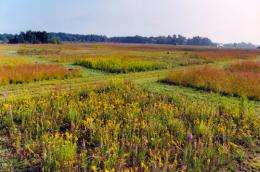Jail cell science

You never know where you might find some intrepid scientists trying to unlock some of nature's mysteries. Forest ecologist Nalini Nadkarni came up with an idea that brings science to a most unlikely place -- prison!
"I have found that by including prisoners in my science project, I get a group of people who have time, who have space, and, as it turns out, have a deep interest in nature," explains Nadkarni.
With help from the National Science Foundation (NSF), Nadkarni and environmental scientist Carl Elliot study rare prairie plants, but nowhere near the prairie. They are behind the walls and razor ribbon at the Stafford Creek Corrections Center in Aberdeen, Wash. The inmates, referred to as "offenders," aid the researchers by planting seeds, observing plant growth and then recording data.
Offender number 795727 is Terry Essick. "Most of us have taken and taken, and now it's time for us to give back," he says. Essick is in the middle of serving a 20-year sentence as an accomplice to murder. "I'm paying my debt to society--if it requires planting plants for a prairie project that's paying my debt to society, that's what I'm doing."
Nadkarni studies the dwindling prairie plants to learn how best to cultivate them in the wide open spaces they call home. The effort is appreciated within the narrow confines of incarceration. Inmates such as Essick are grateful. "For anybody to actually make the effort that they've made to see this through is great," says Essick.
It's a win-win proposition. You might think of it as science redemption; scientists get a reliable staff of long-term research collaborators and inmates get a job that beats stamping out license plates. "It teaches me something," says Essick. "It makes me work with people and it's just a new skill that I've learned."

Learning here goes in both directions and that leads Nadkarni to an ironic hypothesis about human nature. "Everyone can be a scientist--everyone can relate to nature, everyone can contribute to the scientific enterprise, even those who are shut away from nature," she says.
And her journey inside the prison walls has led to another piece of irony. "It's in many ways terribly depressing to walk into a high security prison and to know that some of these men are going to be there for the rest of their lives. I walk away enlightened," she adds.
Other prisons across the country and around the world are now interested in bringing science and scientists behind bars as well.
Provided by National Science Foundation
















